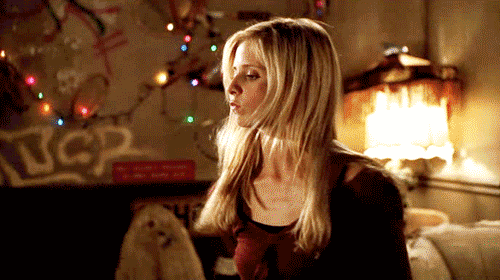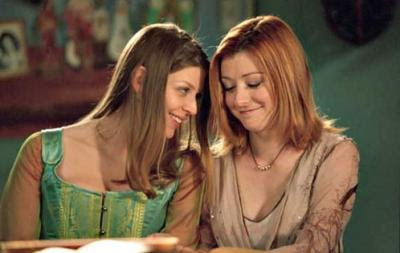Why Buffy‘s Willow Was Never My Witch


You would think based on, well, everything about me that there would be no character in all of genre television that I would relate to more than Willow Rosenberg of Buffy the Vampire Slayer. I am a red-head and a witch by choice, like her, and also like her, I am a queer woman and a nerd by my nature. Willow is smart, plucky, a little awkward and very magical. She is me … so why did I never click with her?
I think it’s because Alyson Hannigan’s Willow, possibly more than any character on Buffy, showed the limitation and failings of the show. She wasn’t a bad character, per se, she was charming and funny and went through a lot … but she also was a character who looked neat from the outside, yet rang hollow for me in other ways, and the way she was used and the messagess her arcs conveyed were hardly magical, or feminist. This is a problem for me with a lot of Buffy, actually.
Buffy was a big deal in its time. It still is. It was the culmination of the “girl power” of the 90s and into the 2000s. The idea of petite blonde fighting monsters was just so WILD, right? Now that feels almost trite, but for Joss Whedon at least, it was a big subversion to see the typical damsel in distress become the hero. (This actually wasn’t that revolutionary but that’s a different article.)
But that really wasn’t the hook of Buffy. It was fun and kinda spooky, had great romances and myth, but the feminism ended up being incidental. It was like an accessory, not necessarily the core, something Buffy, the show and character, exuded but was not really there. I’ll give you a metaphor.

This gif, right here. It’s so iconic, it looks so cool. But she ends it holding the stake wrong if she wants to stab with it or throw it. It looks cool and badass and impressive, but it’s actually non-functional and just for show, and I feel like a lot of the feminist elements of Buffy are a lot like that in hindsight now too. They looked neat but didn’t really do much.
Which brings me back to Willow. Like Buffy, and even Xander and Angel, Willow fit into a pretty well-worn trope when she was introduced: the nerdy, wallflower best friend. Unlike Buffy, Willow took a lot longer to begin to subvert it. Throughout season two she gets sexier and a bit more self-possessed, which passes for some kind of growth, but she really becomes “powerful” when she starts to do magic.
Again, we have to step back to look at Buffy in the context of its time. There was a lot of magic and witchcraft around in the ’90s, and a lot of it also integrated ideas and terms from the religion of Wicca. Some shows, like the original Charmed, managed to integrate Wiccan concepts pretty well, but Buffy did not.
Not only did they call Willow “a Wicca” (cringe) but they took a faith and practice that was about women finding their power and connection, and they made it into a metaphor for how power can corrupt a woman if she wants it for the wrong reasons. And also drugs? It was bad.
Willow’s magic was almost always associated with her most negative character traits and her poorest choices. She accidentally cast spells on her friends and put people in danger, but she remained drawn to magic because it made her feel powerful. The more powerful she was though, the more dangerous and selfish she became.
In some ways this is fine. People who are insecure and get power use it in bad ways if they don’t address their underlying issues. That’s life. But the conflation of that with the idea of specifically Wiccan magic and then the combination of that with the idea that magic was an addictive drug … it not only didn’t make sense as a double metaphor, but the show also undermined it.

The “magic as drugs” metaphor failed in so many ways. Firstly, it was part of a plotline that set the show up to be the archetype for the “dead tragic lesbian” trope when Willow’s lady love Tara was killed and Willow went insane with magic and vengeance. It sent all sorts of bad messages about Willow, about women and grief, and even about magic. Women with power could be dangerous and bad if they got too emotional? What?
A lot of these issues were addressed better in season seven, where Willow had to learn to use magic in the right ways for the right reasons. But the fact that Willow didn’t get the choice to use magic was also tricky. Willow remained an insecure, selfish character who was often defined by that and endangered her friends and loved ones because of that.
And then there was Willow’s sexuality. This was something that was also tied in with her magic. Magic was not just a gateway to power for Willow, it was the key to her first queer relationship. Because of television standards at the time, Willow and Tara weren’t allowed to kiss on screen much at all until season six, so in season four when they met their magic together as a substitute for sex scenes.
I totally love the association of magic and witchcraft with queerness, until you look at how Willow looked at magic—how it was about power over others for her. And her magic as it integrated with her relationship with Tara also became about power, in this case of Tara. And as our Princess Weekes pointed out in writing about Willow and Tara’s toxic relationship, their dynamic became so seriously problematic that Willow essentially denied Tara of consent by magically erasing her memory, “using power to take control over someone else for [her] own sexual and emotional needs.” Then Tara died to make Willow a villain.
It may seem from all of this that I’m negative overall towards Buffy, which isn’t true. I loved the show as a teen and it defined an entire generation of television. But that influence is both good and bad. Buffy was smart and creative and dealt with tough stuff, and pushed the limits of genre television. But it was also only a first step, and it had many flaws. Flaws, however, don’t mean that it’s not entertaining and iconic even so.
And without characters like Willow and shows like Buffy, however flawed, we wouldn’t have the amazing women, witches and queer characters we have today.
(image: Fox)
Want more stories like this? Become a subscriber and support the site!
—The Mary Sue has a strict comment policy that forbids, but is not limited to, personal insults toward anyone, hate speech, and trolling.—
Have a tip we should know? [email protected]
